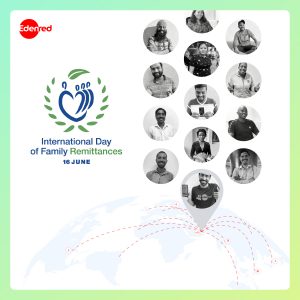The UAE has long been a land of expats. At Edenred UAE, we love celebrating the extraordinary strength and sacrifice of millions of employees who send money home. Remittances (UAE) i.e. the money or their salary that migrants in the UAE send to their home countries, is a crucial source of income for many families and this also plays a huge role in the economic growth of countries.
Who sends remittances?
Remittances are typically sent by foreign or expatriate workers or individuals with familial ties abroad. These funds are sent to support household income in the recipient’s home country.
Why do remittances matter?
Remittances are a crucial source of income for families in low- and middle-income countries (LMICs), providing essential support for livelihoods and contributing to economic stability. These funds enable families to meet their immediate needs, such as food, housing, and healthcare, while also facilitating investments in education and entrepreneurship. In fact, remittances have become one of the largest financial flows to LMICs, surpassing official development assistance and equaling foreign direct investment.
Over the past decade, migrants have sent an astounding $5 trillion in remittances to their home countries, underscoring the importance of these financial transfers in fostering economic resilience. Looking ahead, it is projected that an additional $4.4 trillion in remittances will flow to LMICs by 2030. This significant influx of funds will be vital in addressing the growing financing gaps for sustainable development, as many developing countries require substantial investments to achieve their economic and social goals.
Remittances have a significant impact on developing economies in these aspects:
- Poverty Reduction: Remittances provide a direct source of income for families, helping them meet basic needs like food, shelter, and healthcare. Studies show a strong correlation between remittance flows and a decrease in poverty rates.
- Education and Healthcare: Remittances can be used to invest in education and healthcare, improving the overall well-being of families and communities.
- Entrepreneurship: In some cases, remittances provide capital for small businesses and entrepreneurial ventures, stimulating local economies.
- Financial Stability: Remittance flows tend to be more stable than other forms of foreign capital, offering a buffer during economic downturns or natural disasters.
What is IDFR?
The International Day of Family Remittances (IDFR) is celebrated on June 16th every year, as a way of recognizing the vital role that remittances play in the lives of millions of families around the world. Established by the United Nations, this day aims to raise awareness about the significant contributions that migrant workers make to their home countries through financial support sent back to their families. Remittances are not just a lifeline for many households; they are also a powerful tool for economic development, helping to alleviate poverty and improve living standards.
The UN promotes IDFR as part of its broader commitment to sustainable development and the empowerment of migrants. By highlighting the importance of remittances, the UN encourages governments, organizations, and individuals to recognize and support the positive impact that these financial flows have on communities and economies globally.
How is IDFR celebrated?
IDFR is a universally recognized event adopted by the United Nations General Assembly and is observed on 16 June, every year. The day recognizes the contribution of over 200 million migrants, who send remittances home to improve the lives of their 800 million family members.
According to the IDFR 2023-2024 brochure by IFAD, United Nations, “Over one billion people are directly impacted by remittances annually, either as senders or as recipients. It is estimated that half of the annual flows go to rural areas, where poverty and hunger are concentrated and where remittances count the most. 75% of annual remittance flows address the immediate needs of recipients in terms of food security, access to health, education, housing and sanitation. The remaining 25% is either saved, invested, or used to set up businesses, among others.”
This year, the UN’s theme for IDFR 2024 highlights the growing importance of digital remittances. In light of this, let’s take a look at some key benefits of shifting from traditional money transfer services to digital platforms:
- Reduced Costs: Traditional services often charge high fees, eating into the already limited funds migrants are sending home. Digital platforms can significantly lower these costs, further stretching those hard-earned dirhams.
- Financial Inclusion: Digital remittances connect families to a wider financial ecosystem. Access to mobile banking and online services empowers recipients, particularly those in underserved communities, to manage their finances more effectively.
- Transparency and Efficiency: Digital transfers are faster and more transparent, allowing families to track their money and receive it in a timely manner. This peace of mind goes a long way in supporting families separated by distance.

Remittances and Sustainable Development Goals (SDGs)
Remittances play a pivotal role in achieving the Sustainable Development Goals (SDGs) set forth by the United Nations. These financial transfers not only provide immediate support to families but also contribute significantly to broader economic development.
By enhancing household income, remittances help reduce poverty (SDG 1) and promote food security (SDG 2). They empower families to invest in education (SDG 4) and healthcare (SDG 3), thereby improving overall well-being and quality of life.
However, many developing countries face substantial financing gaps in their pursuit of sustainable development. It is estimated that an additional $4 trillion in investments is needed annually to meet the SDGs. Remittances can help bridge this gap by serving as a reliable and direct source of funding for households. As families receive these funds, they can allocate resources towards essential services and investments that contribute to economic growth and social progress.
Impact on Households
At the household level, remittances serve as a crucial financial lifeline, providing families with the means to cover their immediate needs, such as food, shelter, and healthcare. This financial support is particularly vital in low- and middle-income countries, where access to formal financial services may be limited.
While a significant portion of remittances is directed towards daily expenses, research indicates that up to 25% of these funds are allocated to income-generating activities and long-term goals. Families often use remittances to invest in housing, savings, education, and healthcare, thereby enhancing their overall economic stability and resilience. By enabling families to pursue these opportunities, remittances contribute to breaking the cycle of poverty and fostering sustainable development within communities.
Conclusion
Blue-collar workers, who make up a substantial portion of the workforce in the UAE, are particularly active in sending remittances. they are often highly skilled and contribute immensely to the economies of their host countries, where their earnings are vital for supporting their families and communities. They fill labour shortages, boost innovation, and enrich communities. That’s why we call them ‘Champions’.
At Edenred UAE, we are committed to playing our part in this critical story. We believe in ensuring that all workers are paid on time and fairly, so they have the resources to support their families back home. In conclusion, remittances are a crucial lifeline for families, providing essential financial support that enables them to meet their immediate needs and invest in their futures.
As we celebrate IDFR, it is essential to recognize and support the contributions of migrant workers who send money home. Let us recognize the vital role remittances play in building a brighter future for millions and strive to foster supportive environments for both migrants and their families.




